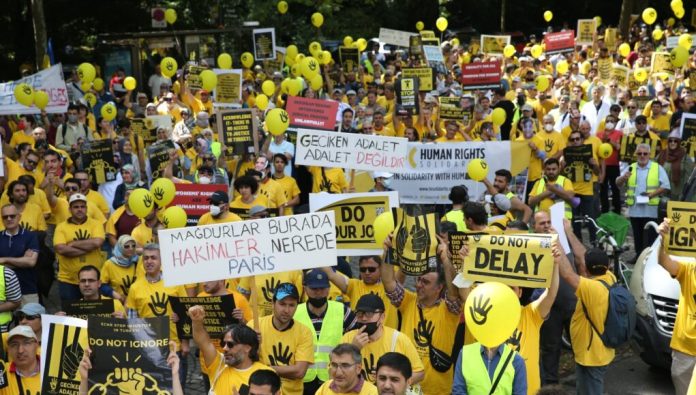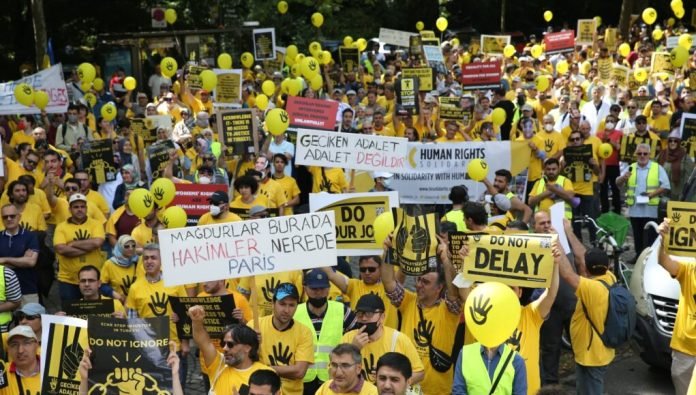
Thousands of Turkish expatriates are expected to gather in Strasbourg on Wednesday for the fourth annual demonstration outside the Council of Europe (CoE) and the European Court of Human Rights (ECtHR) buildings, urging European institutions to take urgent action against persistent human rights violations in Turkey, Turkish Minute reported.
Similar protests were held in2022,2023and2024in front of the ECtHR, attended by hundreds of victims of a Turkish government purge following a failed coup in Turkey in 2016 as well as activists and EU parliamentarians.
The ECtHR is accused by victims of human rights violations in Turkey, which increased after the coup attempt when the government launched a crackdown on non-loyalist citizens under the pretext of an anti-coup fight, of failing to process victims’ applications expeditiously and in some cases making judgments in favor of the Turkish government. The CoE is accused of not using the tools at its disposal to force Ankara to abide by ECtHR rulings that are in favor of victims.
Turkey hasdefiedECtHR rulings faulting Turkey for violating the rights of imprisoned philanthropistOsman Kavalaand Kurdish leaderSelahattin Demirtas.
In addition to these cases, a local court in Turkey again convicted former teacher Yüksel Yalçınkaya of terrorism in September 2024, despite the ECtHR finding a violation of his fundamental rights last year. The Kayseri 2nd High Criminal Court sentenced him to six years, three months, the same as his original conviction in 2017.
The conviction in the retrial is subject to an appeals procedure, and the new decision will be finalized after a judgment by Turkey’s Supreme Court of Appeals.
At the heart of the case is the Turkish government’s crackdown on the Gülen movement, a faith-based civic initiative inspired by the late Muslim cleric Fethullah Gülen. For decades, the movement operated a global network of schools and charities, including hundreds of educational institutions inside Turkey. It was publicly supported by successive Turkish governments until 2013.
Turkish President Recep Tayyip Erdoğan has been targeting followers of the Gülen movement since corruption investigations revealed in 2013 implicated then-prime minister Erdoğan as well as members of his family and inner circle.
Dismissing the investigations as a Gülenist coup and a conspiracy against his government, Erdoğan began to target the movement’s members. His government designated the movement as a terrorist organization in May 2016 and intensified the crackdown on it following the abortive putsch in July of the same year that he accused Gülen of masterminding. The movement strongly denies involvement in the coup attempt or any terrorist activity.
Since the failed coup, at least 705,172 people have been investigated on terrorism or coup-related charges due to their alleged links to the movement. There are currently at least 13,251 people in prison as a result of pretrial detention or convictions related to terrorism in Gülen-linked trials.
The Grand Chamber of the ECtHR ruled in September 2023 that Turkish courts had violated Yalçınkaya’s rights under Article 7 of the European Convention on Human Rights by convicting him without individualized evidence or proof of intent.
Yalçınkaya was sentenced to more than six years in prison largely for having used ByLock, an encrypted messaging app that Turkish authorities claim was exclusively used by members of the Gülen movement.
The court said that mere use of the app, along with membership in a now-banned teachers’ union and an educational association, did not meet the threshold for terrorism-related charges and that Turkish courts had relied on broad, retroactive interpretations of the law.
It also found violations of Article 6, the right to a fair trial, due to the lack of transparency and procedural safeguards in handling digital evidence, and Article 11, the right to freedom of association, over the criminalization of lawful union and civil society activity.
Despite the ECtHR ruling that ordered the Turkish government to redress Yalçınkaya as well as submit an action plan to address systemic issues that resulted in thousands of unjust convictions, detentions and prosecutions of alleged Gülen followers continue based on activities that have been classified as criminal by Turkish courts, but not by the ECtHR.
The Committee of Ministers of the Council of Europe has been ignoring calls to speed up the monitoring of Turkey’s compliance with the ECtHR judgements.
‘Justice for everyone’
Organized by the Peaceful Actions Platform, a coalition of 24 civil society organizations, the event will take place in front of CoE headquarters and continue with a march to the ECtHR building. This year’s theme is “Justice for Everyone,” underscoring what organizers say is the growing demand for the rule of law to apply universally — to all victims, regardless of political or social affiliation.
According to the platform, Turkish authorities have detained at least 6,503 people since the ECtHR ruling on Yalçınkaya, based on similar allegations, including the use of the ByLock app or links to the faith-based Gülen movement.
Protesters also plan to draw attention to the imprisonment of opposition politicians, ongoing detentions of Kurdish journalists and activists and the removal of elected mayors, including the politically chargedArrest of Istanbul Mayor Ekrem İmamoğluthe main opposition’s presidential candidate. They say these developments signal the collapse of democratic mechanisms in Turkey and its judiciary.
“With a politicized judiciary and law enforcement acting under the government’s command, law is being used as a tool to silence dissenters,” the platform said. “Without law-abiding law enforcement and a judiciary independent from politics, ‘justice for everyone’ is not possible.”
The demonstration will feature symbolic displays and performances, including a 20-meter-long “Justice Wall,” hand-painted with scenes representing rights abuses in Turkey. Participants will be invited to add personal messages on the wall. The wall includes depictions of imprisoned political figures, crackdowns on university students and scenes of families torn apart by detentions.
Among the protest’s creative elements will be human-sized cardboard cutouts carried during the march, each representing an individual affected by the crackdown in Turkey. Also planned is a theatrical performance portraying the indifference of European institutions through a fictional news broadcast highlighting real cases such as the imprisonment of minors, elected officials and mothers with children.
Cyclists from several European countries have joined a decentralized “Ride for Rights” campaign, completing solidarity rides in their regions ahead of the demonstration.
During the protest, organizers will hand a letter to ECtHR President Mattias Guyomar urging the court to expedite the processing of applications and enforce implementation of its rulings. A separate appeal will be made to the Council of Europe to take firmer measures to ensure Turkey’s compliance with its international obligations.
Journalists’ decade in prison
The demonstrators will also shine a spotlight on the continued imprisonment of two journalists, Hidayet Karaca and Mehmet Baransu, whose prolonged detentions and delayed European court proceedings have become emblematic of Turkey’s crackdown on press freedom as well as CoE inaction.
Roeformer head of the Samanyolu Media Group, marked his 10th year in prison this December. Initially arrested in 2014 over the broadcast of a fictional television series allegedly insulting a religious group, he was later handed down a series of prison sentences amounting to nearly 300 years, including an aggravated life sentence that Turkey’s top court has since annulled. In 2023 the ECtHR ruled that Karaca’s initial pretrial detention had violated his rights and ordered compensation, but stopped short of demanding his release. A second application, filed in early 2023 after exhausting domestic remedies, remains pending.
Mehmet Baransuanother target of the protesters’ demands, has been behind bars since 2015. Known for his investigative reporting for the now-defunct Taraf newspaper, Baransu was prosecuted over revelations including a military coup plan and alleged state corruption. Despite being one of Turkey’s most internationally cited investigative journalists, his continued imprisonment has been met with silence from many rights groups.
Baransu was sentenced in 2022 to 13 years in prison over classified documents but remains incarcerated pending other trials, including one accusing him of attempting to overthrow the government — a charge based on reporting on tainted rice imports. Protesters argue that his case represents how investigative journalism exposing corruption is equated with terrorism.
The protest is expected to draw participants from across Europe, including former public servants dismissed by emergency decrees, relatives of political prisoners and human rights advocates. Mini-concerts and brief testimonies from victims are also planned throughout the event.
Previous Strasbourg protests organized by the platform attracted wide participation and international attention. Organizers say they will continue to hold the event annually until the institutions “move from concern to action.”
The protest will be broadcast live on MC EU TV and the Peaceful Actions Platform’s YouTube channel.




